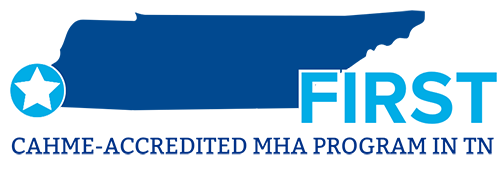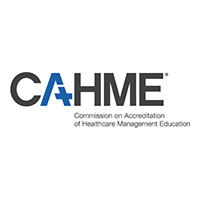Master of Health Administration (Campus Track)
Learn. Lead. Care.
 About the Program
About the Program
The University of Memphis Master of Health Administration (MHA) program is a nationally-ranked program with an award-winning emphasis on leadership and professional development. For 28 years, the Memphis MHA Program continues to prepare healthcare leaders, now boasting over 450 alumni currently working in 35 states and internationally. The UofM MHA Program is Tennessee's first CAHME-accredited MHA program. Small class sizes and a 6:1 student-to-faculty ratio assure an environment of personalized professional development that equips our students with the competencies and skills needed to thrive as healthcare leaders in an increasingly complex workplace.
The 45-credit  hour on-campus track can be completed full-time in two academic years (21 months)
or part-time in as few as three years. Evening classes accommodate both full- and
part-time students. Most of our full-time students are placed in paid, 20 hour per
week administrative residencies with healthcare organizations across the Memphis area
for experiential learning outside the classroom. In addition to our administrative
residencies and our CAHME accredited curriculum, the cornerstone of our award-winning
approach to leadership development is our "Day One" program, which includes a team
development wilderness retreat prior to entering the program and a series of seminars
that address core professional competencies such as interviewing, resume design, networking,
dining etiquette, dressing for success, and presentation/advocacy skills. Many of
our students receive a significant number of nationally-competitive post-graduate
fellowships. Our students also find post-graduate career opportunities through their
administrative residency experiences. Importantly, for the past three years, the Memphis
MHA program has a 98% 90-day job placement rate. With among the most affordable tuition
rates and lowest costs of living in the country, the University of Memphis MHA program
is an exceptional educational opportunity.
hour on-campus track can be completed full-time in two academic years (21 months)
or part-time in as few as three years. Evening classes accommodate both full- and
part-time students. Most of our full-time students are placed in paid, 20 hour per
week administrative residencies with healthcare organizations across the Memphis area
for experiential learning outside the classroom. In addition to our administrative
residencies and our CAHME accredited curriculum, the cornerstone of our award-winning
approach to leadership development is our "Day One" program, which includes a team
development wilderness retreat prior to entering the program and a series of seminars
that address core professional competencies such as interviewing, resume design, networking,
dining etiquette, dressing for success, and presentation/advocacy skills. Many of
our students receive a significant number of nationally-competitive post-graduate
fellowships. Our students also find post-graduate career opportunities through their
administrative residency experiences. Importantly, for the past three years, the Memphis
MHA program has a 98% 90-day job placement rate. With among the most affordable tuition
rates and lowest costs of living in the country, the University of Memphis MHA program
is an exceptional educational opportunity.
The MHA program, located in the University of Memphis CEPH-accredited School of Public Health, is a full graduate member of the Association of University Programs in Health Administration (AUPHA), and belongs to ACHE's Higher Education Network (HEN).


The mission of the University of Memphis MHA Program is to provide a high-quality educational experience that will, through both on-campus and executive tracks, prepare students for success in a variety of healthcare institutions. View Mission, Vision, and Values >
 Connect with our Admissions Team
Connect with our Admissions Team
Shirl Sharpe, MS
Academic Services Coordinator II
ssharpe@memphis.edu
(901) 678-1710
Christie Rakestraw
Graduate School Admissions Counselor
crakstrw@memphis.edu
901.678.4489
 Admission Information
Admission Information
Requirements:
- A Bachelor’s degree is required for admission with a minimum GPA of 3.0
- Two (2) letters of recommendation
- Statement of Purpose (400-500 words)
- CV/Resume
- International students:
- Transcripts from degrees obtained outside of the United States must be evaluated by WES or by any members of the National Association of Credential Evaluation Services
- Test of English proficiency scores are required if language of instruction for prior degrees was not English (minimum scores)
- Interviews with faculty
 Deadlines
Deadlines
- Fall Semester - July 15*
- Spring Semester - December 15*
**International applicants should plan to have their applications in by May 15 for Fall Semester and October 15 for Spring Semester to ensure sufficient time to receive your Form I-20 and visa.
 Curriculum
Curriculum
45 Credit Hours Required with a 3.0 GPA
- Core Courses (42 credit hours)
- Three (3) hours of internship
Recommended Course Sequence
Year 1
Fall 1
- HADM 7105 Health Policy & the Org. of Health Services
- HADM 7605 Human Resources Administration
- HADM 7108 Health Care Finance I
- HADM 7116 Administration of Health Services Orgs
- HADM 7100 Day One
Spring 1
- HADM 7102 Healthcare Law
- HADM 7204 Healthcare Quality & Outcomes Mgmt.
- HADM 7208 Health Care Finance II
- HADM 7209 Quantitative Methods in Health Services
- HADM 7101 Day One
Summer 1
HADM 7190 Internship (register during Fall 2)*
(*students will complete the internship during the summer and will register for the
course the following fall semester to receive credit.)
Year 2
Fall 2
- PUBH 7710 Health Economics
- HADM 7103 Health Planning
- HADM 7140 Population Health Management
- HADM 7190 Internship*
Spring 2
- HADM 7110 Leadership & Organizational Change
- HADM 7210 Comprehensive Experience in Healthcare Mgmt.
- HADM 7109 Health Administration Information Systems
 Competencies
Competencies
Leadership
- Articulate, model, and reward professional values and ethics
- Understand and model stewardship of organizational resources
- Know, support, and use team development methods
- Use system and strategic thinking models and methods to make decisions and solve problems
- Understand and apply models and methods of organizational change and innovation
Communication
- Write clearly and effectively
- Speak clearly and effectively before individuals and groups, in formal and informal settings
- Display effective listening and communication skills
- Listen, hear, and respond effectively to the ideas and thoughts of others
- Develop, organize, synthesize, and articulate ideas and information
Critical Thinking
- Learn from mistakes
- Ask the right questions when making decisions
Finance/Analysis
- Understand the structure and conduct of quantitative and analytical methods, including economic and financial evaluation, linear regression analysis, and forecasting methods
- Monitor data and identify deviations for both internal processes and procedures and for external trends
- Evaluate testable hypotheses commonly arising in a management setting, selecting and applying appropriate quantitative methods
- Examine qualitative and quantitative data to determine patterns and trends
Management
- Work effectively with other professionals
- Understand, demonstrate, and reward cultural sensitivity and competence
- Understand and apply basic concepts and tools that are integral to strategic thinking, planning, and management



